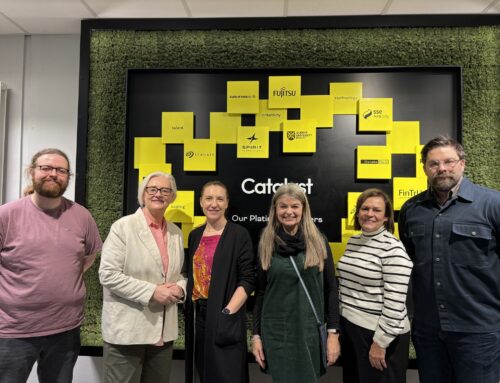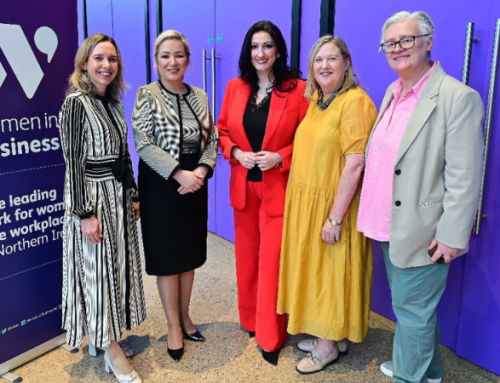Interviewing 16 deep tech female founders for the EPIC-X project felt like the opportunity to see into “tomorrow’s world”. Their application of cutting-edge ideas and technologies has immense potential to alter the way we live our lives, care for ourselves and others, and enhance the daily human experience.
But as we talked, it was clear that the greatest female researchers, innovators and entrepreneurs are facing prejudices and barriers from “yesterday’s world” of business.

Innovation meets an outdated business start-up ecosystem
The drive to help improve lives through innovation is creating a new generation of deep-tech female-founders. They are working hard for change but are frustrated and impeded by the business start-up culture they are working within.
In May 2025, I interviewed 16 deep-tech female founders as part of Enterprise Evolution’s research for the EPIC-X project, a pioneering European initiative designed to drive inclusive innovation in women-led deep-tech start-ups. The interviews showcased the power of business to make the difference, to fast-track research out of the lab and out of the university, into the mainstream and into people’s lives.
Some were presenting innovations so new that they felt the “technology could do the talking.” It was sobering to hear their real-life experiences.
When preparing to pitch in front of venture capitalist (typically to raise large sums to develop the business) they had expected to be challenged on the rigour of their research, the credibility of the science and their history of evaluation and verification of the data. They were prepared, briefed and focused. As principal investigators, female founders and lead researchers, they did not expect to receive business advice to “step back” or “stay away.”
… they had expected to be challenged on the rigour of their research, the credibility of the science and their history of evaluation and verification of the data.
Eroding Confidence through Business Norms
When pitching, many of the female founders were advised not to “go it alone” as lead of business or research. They were advised to send a male business partner or even a more junior male colleague, and let him be the public face of the business.
“I followed the rules that they were … not imposing… but kind of ‘strongly suggesting’ and I (couldn’t be the one who) hurt the business. We need the money, so of course we are going to play by the rules, or at least the unspoken rules. And I kind of regret that.”
“We need the money, so of course we are going to play by the rules, or at least the unspoken rules. And I kind of regret that.”
While this advice could be seen as the classic business tenet “know your customer”, one founder shared the long-term detriment that accepting this advice had on her confidence and business.
Letting her male colleague take the lead and gain experience in the early rounds of pitching set a precedent for the business culture. The small decision determined the company’s tone and defined the limits of her role as principal researcher. It perpetuated the lazy assumptions of the start-up ecosystem.

Accelerating, yet everything stays the same
Most disappointing was then role of accelerators, business incubators and business support. Several founders cited experiences of being publicly challenged on their knowledge and expertise more than their male counterparts when practice-pitching.
Their own cohort of entrepreneurs, researchers, and founders were the ones to call this practice out – seeing the double standard. These barriers exist within the very system designed to support deep-tech founders and bring forward technology that will benefit us all.
Tomorrow’s Technology, Yesterday’s Attitudes
The irony is striking. Research has long shown that women entrepreneurs are funded less, questioned more, and given fewer opportunities. Beyond personal frustrations, limitations and impact the societal loss is clear.
These founders have research that could change lives. They are at the cutting edge of innovation yet encountering a culture entrenched in bias that limits its potential. If the future lies in deep tech, we cannot afford to let outdated eco-system hold back half of our innovators.

EPIC-X
EPIC-X is working to unite diverse stakeholders to create an inclusive and equitable deep tech ecosystem, empowering women-led start-ups, fostering cross-border collaboration, and dismantling systemic barriers to innovation across Europe. Because we can’t wait.
Find out more about the Epic-X programme here.

About the Author: Alison Price is an Enterprise Educator with extensive experience of delivering development programmes in China, UK and across Europe She specialises in developing institutional capacity through staff development programmes, mentoring, and delivering sector-level consultancy in support of the enterprise education agenda.
Alison has published within the field of strategic management, corporate social responsibility, small business start-up as well as enterprise education. She has also been Visiting Professor of Enterprise Education at Liverpool John Moores University.
Connect with Alison on LinkedIn here.





Leave A Comment